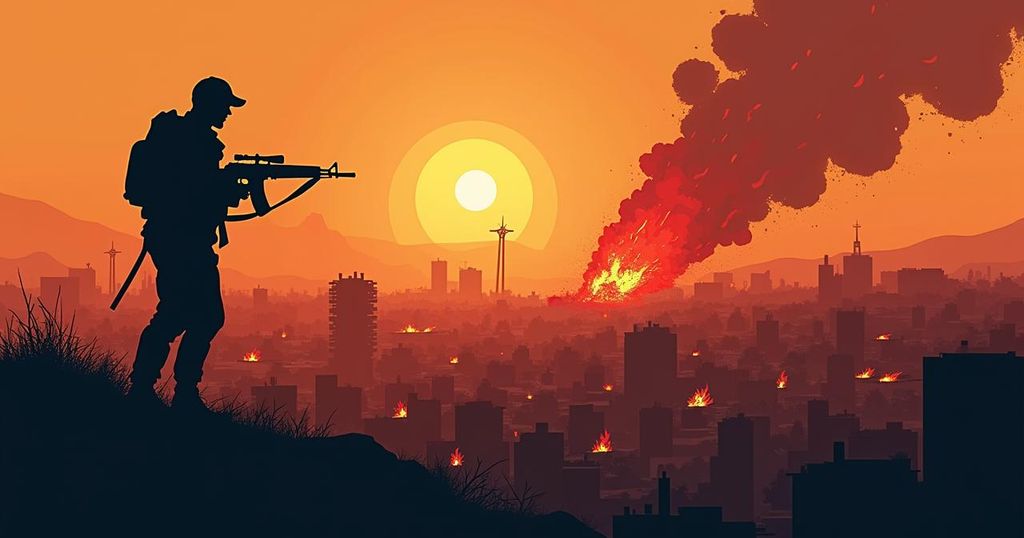Israel is currently engaged in cross-border strikes with Hezbollah amid the ongoing war in Gaza, which has now entered its second year since the October 7, 2023 attacks by Hamas. The situation remains dire, with significant military actions resulting in thousands of casualties and a severe humanitarian crisis in Gaza. The U.S. continues to support Israel, even as tensions with some American politicians rise.
In recent developments, Israel has engaged in significant cross-border confrontations with Hezbollah, marking a renewed escalation in regional hostilities. This turn of events transpired overnight, on the anniversary of the October 7, 2023 attacks by Hamas that had Previously initiated an Israeli military campaign in Gaza, now extending into its second year. Reports from Lebanon’s state news agency indicated that Hezbollah executed strikes on several Israeli settlements and the Glilot military base in proximity to Tel Aviv. The Israeli military responded with attacks on over seventy Hezbollah targets within a single day, which included strategic sites such as Hezbollah’s intelligence center in Beirut and a weapons manufacturing facility. The ongoing Israel-Gaza conflict, which has persisted for more than a year, has broader implications, reaching into neighboring regions. The hostilities ignited when Hamas conducted an unprecedented assault on October 7, 2023, resulting in the deaths of approximately 1,200 individuals and the abduction of numerous civilians. This provocation prompted Israel to declare war on Hamas and subsequently launch a ground invasion, leading to the most significant displacement crisis in the region since 1948. As of July 2024, the conflict took a decisive turn with the assassination of Hamas leader Ismail Haniyeh, a move attributed to Israeli forces. The tensions between Israel and Hezbollah have surged in the past year, resulting in an Israeli offensive in southern Lebanon. Israeli airstrikes have intensified, claiming over 1,400 lives, including that of Hezbollah’s long-standing leader, Hasan Nasrallah. The history of violence along the Israel-Lebanon border is deeply rooted and extends back to the founding of Israel. In the Gaza Strip, Israel has conducted one of the most devastating military operations of the century. This conflict has led to the deaths of tens of thousands, pushing at least half of Gaza’s population into dire humanitarian conditions resembling famine. Despite mounting pressure from Western allies to facilitate a more substantial influx of humanitarian assistance into this region, Israel has maintained its reluctance to do so. U.S. engagement remains pivotal; although relations between Israeli Prime Minister Benjamin Netanyahu and some American politicians, including President Biden, are strained, the United States continues to extend support to Israel through military aid and financial packages. The U.S. has also exercised its veto power on United Nations resolutions calling for cease-fires, thereby influencing the course of this conflict. The intricacies of the Israeli-Palestinian conflict are deeply entrenched, with historical grievances that predate the establishment of Israel in 1948. Thus, the current confrontations are not merely isolated incidents but rather part of a larger, ongoing struggle.
The article discusses the ongoing conflict between Israel, Hezbollah, and Hamas, highlighting the violence that has escalated over the past year, especially following the October 7, 2023 attacks by Hamas which triggered military responses from Israel. It provides an overview of the humanitarian crisis in Gaza and the role of regional and international actors, including the United States, in this complex backdrop of historical grievances that underlie the Israeli-Palestinian and Israeli-Lebanese conflicts. The dynamics between these parties have broad implications for the stability of the Middle East.
In conclusion, the conflict involving Israel, Hamas, and Hezbollah presents a multifaceted crisis characterized by military engagements, significant casualties, and a worsening humanitarian situation. The complexity of the issues at play, combined with international involvement, underscores the urgent need for a diplomatic resolution to prevent further escalation and humanitarian disasters in the region.
Original Source: www.washingtonpost.com






